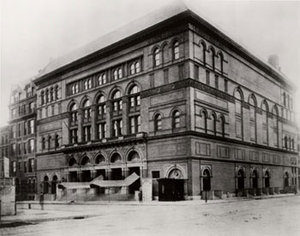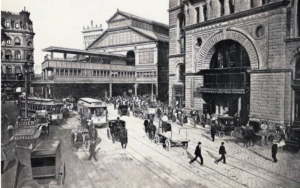By: Cal Hoag, Ashley Daddona, Jenna Doolan, Margaret Pigliacelli, Kat Johnson, Micayah Ambriz, Ellie Walker
Movement, transition, and togetherness are major components of the lives of the characters in Toni Morrison’s Jazz as well as in the spiritual improvement of the sinners found in Dante’s version of purgatory in Purgatorio. Movement within the minds of sinners as they re-evaluate and repent for their actions on Earth is manifested in physical movement up and down Mount Purgatory. Canto IV describes the mount: “This Mount is not like others: at the start / it is most difficult to climb, but then, / the more one climbs the easier it becomes” (88-90). This journey appears to be a simple movement from bottom to top, yet the path is not so linear as it circles around and around the mountain as it comes to the precipice.
Morrison’s novel follows this same roadmap laid out by Dante as a casual, seemingly omniscient narrator describes a fraught, loveless marriage between characters Joe—who had just murdered his young teenage lover, Dorcas—and Joe’s wife Violet—who assaulted Dorcas’ body in a rage as it was presented at her funeral. The start of the couple’s journey is difficult and full of pain as they attempt to rebuild and reconcile their relationship, yet as they move up their personal purgatorial mountains the journey gets easier because of the way they simultaneously move backward in time.
With memory as a basis of time, movement of the characters and Jazz’s narrator is no longer progressively forward (or upward) based, mirroring the inconsistent rise and descent of a soul, or Dante and his guide Virgil, through purgatory. The specific movement of the forward into Paradise in which the original guides leave their pilgrims so that another will take their place is similar in both works. At the end of Dante’s Purgatorio, Virgil is suddenly replaced with Beatrice who will lead Dante through Paradise. At the end of Jazz, the narrator leaves Joe and Violet when Felice appears. The etymology behind the name Felice is ‘happiness’ and ‘luck’ which could symbolize Joe and Violet’s movement into Paradise hence the change in guides. This movement could also refer to their spiritual happiness and paradise as well.
In Paradiso, Beatrice berates Dante for his previous physical love of her as he was only infatuated with her outside appearance and this isn’t true love. It is the spiritual love beyond the face that allows people to reach true happiness and become closer to God. In Jazz, Joe has moved from his excessive love of the flesh into a state closer to spiritual love which allows him to be happy with Violet and not seek out Felice the same way he did Dorcas. Dorcas was the object of his infatuation with the physical appearance and it took his movement through his own purgatory to reach this spiritual awakening.
The passage of time to the characters almost becomes irrelevant, as their versions of reality become rooted in the past, making it difficult for readers to identify how time passes and nearly impossible to trust the characters’ judgment or acknowledgment of time because it is strongly based on memory. The same could be said for grief: there is no linear path from start to finish, but instead, an individual must constantly return to the past in order to proceed further still. Our group had a similar experience while completing this project. Similar to Virgil being replaced by Beatrice, our guide was also replaced as we were exiled from campus. Our circumstances while doing this project are so different from what we did for the first collaborative essay that, separated from each other by long distances and from our memory of Jazz by time and stress, we needed to come together to remember what it was like not only to be a student but to be a person working with other people. In this way, we were also walking a recursive, complex path with no clear beginning or end.


